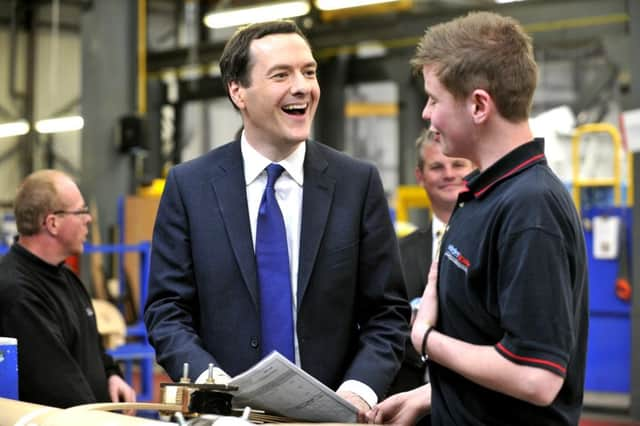Apprenticeship levy on large firms is a ‘blunt tool’ warns CBI


There was a mixed reaction to Chancellor George Osborne’s announcement that he plans to use a levy on large employers to help create three million apprentices by 2020. Firms that are committed to training will be able to get back more than they put in, the Chancellor said.
John Cridland, CBI Director-General, said: “Firms want to play their part in training up more apprentices but an apprentice levy is a blunt tool. A volunteer army is always better than conscription but the CBI will work with the Government to make the best effect of this measure.”
Advertisement
Hide AdAdvertisement
Hide AdThere was a more positive reaction from Jonathan Oxley, the chairman of the Institute of Directors (IoD) in Yorkshire, who said: “I am extremely pleased to see resources being used to train people in the skills required by employers, and through a system where the training is delivered by those who best know what they need in their businesses.
“Many people would have been better served by such a system as opposed to obtaining academic qualifications as a supposed step along their chosen career route.”
Andy Tüscher, the regional director at the EEF, the manufacturers’ organisation, said that manufacturers will be sceptical about a training levy, “especially as their financial investment in high quality apprenticeships already far outweighs the public subsidy available to them”.
He added: “The Chancellor has given welcome reassurance that the levy would only apply to large firms and will be directly controlled by employers. We look forward to discussing with the Government the best way to ensure every penny raised would be spent on valuable training that employers actually need and want. There will be no tolerance among businesses for re-creating the failed and costly skills bureaucracy of the past.”
Advertisement
Hide AdAdvertisement
Hide AdRichard Wright, the executive director of Sheffield Chamber of Commerce, added: “We suspect there will be differing views about the apprenticeship levy within business, but this can be compensated by actually having apprentices in the workforce. The issue here will be whether we can get the quality of people coming through into apprenticeships - schools are currently rewarded for pushing students down academic routes and therefore hanging onto them longer.
A spokesman for the Federation of Small Businesses in Yorkshire said: “The increasing focus on vocational on-the-job training is the right approach but we must not let the drive for greater numbers come at the expense of quality. Encouraging small businesses to take on an apprentice is the only way to deliver the Government’s target of three million apprenticeships.”
Nick Houghton, the managing director of JM Glendinning Insurance Group, which has bases in Leeds and Sheffield, said: “If big businesses are going to get charged a levy, they are going to make it work for themselves. So for a forward thinking large business, this could really work well rather than just be another business tax.”
Penny Marshall, director of the Institution of Civil Engineers (ICE) in Yorkshire and Humber, said she welcomed action which incentivises more employers to offer apprenticeships.
Advertisement
Hide AdAdvertisement
Hide Ad“But it is important that the focus is on creating high quality schemes, rather than simply creating more,’’ she said. “Apprenticeships should be tailored to the needs of the business, and should guarantee employment on successful completion, rather than just offering a period in training.”